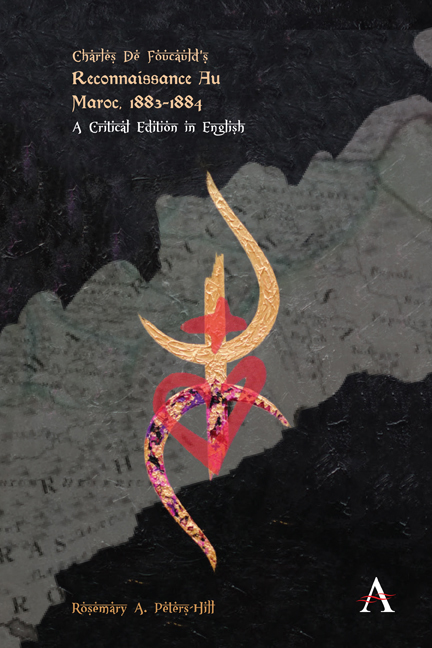Book contents
- Frontmatter
- Contents
- List of Figures
- Acknowledgments
- “There are no roads”: Charles de Foucauld’s Reconnaissance au Maroc—a Critical Introduction
- Charles de Foucauld, Reconnaissance au Maroc, 1883–1884
- Letter to François de Bondy
- Introduction
- Avant-Propos
- I Tangiers to Meknès
- II Meknès to Qaçba Beni Mellal
- III Qaçba Beni Mellal to Tikirt
- IV Tikirt to Tissint
- V Sojourn in the Sahara
- VI Tissint to Mogador
- VII Mogador to Tissint
- VIII Tissint to the Dadès
- IX The Dadès to Qçabi ech Cheurfa
- X Qçabi ech Chorfa to Lalla Maghnia
- Appendix: The Jews of Morocco
- Note on the Materials Used to Draw Up My Itinerary
- Report Delivered to the Société de Géographie de Paris in Its General Session of 24 April 1885
- “Itineraries in Morocco”
- Afterwards: An Afterword
- Glossary of Terms
- Bibliography
- Index
Letter to François de Bondy
Published online by Cambridge University Press: 20 January 2022
- Frontmatter
- Contents
- List of Figures
- Acknowledgments
- “There are no roads”: Charles de Foucauld’s Reconnaissance au Maroc—a Critical Introduction
- Charles de Foucauld, Reconnaissance au Maroc, 1883–1884
- Letter to François de Bondy
- Introduction
- Avant-Propos
- I Tangiers to Meknès
- II Meknès to Qaçba Beni Mellal
- III Qaçba Beni Mellal to Tikirt
- IV Tikirt to Tissint
- V Sojourn in the Sahara
- VI Tissint to Mogador
- VII Mogador to Tissint
- VIII Tissint to the Dadès
- IX The Dadès to Qçabi ech Cheurfa
- X Qçabi ech Chorfa to Lalla Maghnia
- Appendix: The Jews of Morocco
- Note on the Materials Used to Draw Up My Itinerary
- Report Delivered to the Société de Géographie de Paris in Its General Session of 24 April 1885
- “Itineraries in Morocco”
- Afterwards: An Afterword
- Glossary of Terms
- Bibliography
- Index
Summary
My dear François, allow me to offer you with this copy of my book the few hand-written pages that I have attached here; they were written for you alone. Adding to an in-quarto is bold, but you are not obliged to read. The only thing I ask of you, my good François, is to see in this gift a feeble mark of the tender and profound affection of your most devoted cousin.
I am going to tell you of my first days traveling, which will give an idea of all the others; then I will tell you some details about my companion, Rabbi Mardochée; in the course of the volume I will add some explanations about a family of marabouts that gave me good welcome.
First Days of Travel
June 10th, 1883, at five o’clock in the morning, I walk into an old house in the Jewish quarter of Algiers: this is the domicile of Rabbi Mardochée. My companion lives here in a single room with his wife and their four children; he is expecting me, as I am to quit my European clothes at his home and take on the costume of an Israelite. A long blouse with loose sleeves, canvas trousers that go to the knees, a Turkish vest in dark wool, a white tunic with short sleeves and a hood (the djelabia), white stockings, open-topped shoes, a red skullcap and a turban of black silk have all been prepared for me; this makes a half-Algerian, half-Syrian outfit that fits the possibly multiple roles I will have to play. I get dressed, and Mardochée, his wife, his children and I all go out and down the alleystaircases that lead to the port, and to the station for Oran. We will leave for Oran at seven o’clock in the morning by railroad. I ask for two tickets in poor French, to be in keeping with my costume. Mardochée says his goodbyes with his family, and then the two of us are seated in a third-class car. The weather is wonderful, the car is full of Arab workers, and we leave surrounded by good cheer and inundated with sun.
- Type
- Chapter
- Information
- Charles de Foucauld’s Reconnaissance au Maroc, 1883–1884A Critical Edition in English, pp. 75 - 94Publisher: Anthem PressPrint publication year: 2020



